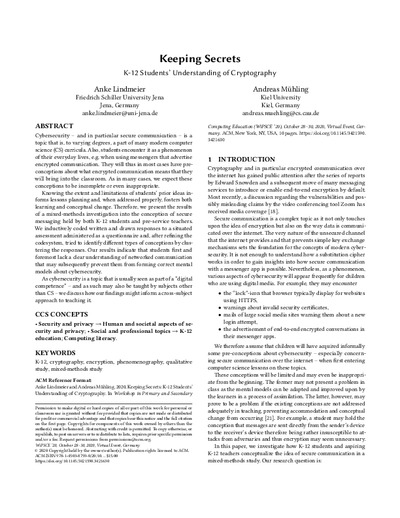Keeping secretsK-12 students' understanding of cryptography
Anke Lindmeier, Andreas Mühling
Publikationsdatum:
Zu finden in: WiPSCE '20, 2020
|
 |
 Diese Seite wurde seit 2 Jahren inhaltlich nicht mehr aktualisiert.
Unter Umständen ist sie nicht mehr aktuell.
Diese Seite wurde seit 2 Jahren inhaltlich nicht mehr aktualisiert.
Unter Umständen ist sie nicht mehr aktuell.
 Zusammenfassungen
Zusammenfassungen

Cybersecurity - and in particular secure communication - is a topic that is, to varying degrees, a part of many modern computer science (CS) curricula. Also, students encounter it as a phenomenon of their everyday lives, e.g. when using messengers that advertise encrypted communication. They will thus in most cases have preconceptions about what encrypted communication means that they will bring into the classroom. As in many cases, we expect these conceptions to be incomplete or even inappropriate.
Knowing the extent and limitations of students' prior ideas informs lessons planning and, when addressed properly, fosters both learning and conceptual change. Therefore, we present the results of a mixed-methods investigation into the conception of secure messaging held by both K-12 students and pre-service teachers. We inductively coded written and drawn responses to a situated assessment administered as a questionnaire and, after refining the codesystem, tried to identify different types of conceptions by clustering the responses. Our results indicate that students first and foremost lack a clear understanding of networked communication that may subsequently prevent them from forming correct mental models about cybersecurity.
As cybersecurity is a topic that is usually seen as part of a "digital competence" - and as such may also be taught by subjects other than CS - we discuss how our findings might inform a cross-subject approach to teaching it.
 Dieses Konferenz-Paper erwähnt ...
Dieses Konferenz-Paper erwähnt ...
 Personen KB IB clear | Yannick Beeck , Christian Borowski , Torsten Brinda , Dennis Brylow , Ira Diethelm , James P. Early , Andreas Gramm , Mindy Hart , Malte Hornung , Matthias Kramer , Agnieszka Kukla , Przemyslaw Pela , Pawel Perekietka , Henning Wilken , Helmut Witten , Stefan Zumbrägel | |||||||||||||||||||||||||||||||||||||||||||||||||||||||||||||||
 Begriffe KB IB clear | DigComp
, Informatikcomputer science
, Kryptographiecryptography
,  LehrerIn LehrerIn teacher
, teacher
,  Lernen Lernen learning
, learning
,  Sicherheit Sicherheit security security
| |||||||||||||||||||||||||||||||||||||||||||||||||||||||||||||||
 Bücher |
| |||||||||||||||||||||||||||||||||||||||||||||||||||||||||||||||
 Texte |
|
 Dieses Konferenz-Paper erwähnt vermutlich nicht ...
Dieses Konferenz-Paper erwähnt vermutlich nicht ... 
 Nicht erwähnte Begriffe | Bildung, DigComp 2.0, Informatik-Didaktik, Informatik-Unterricht (Fachinformatik), Kinder, Schule, Unterricht |
 Tagcloud
Tagcloud
 Zitationsgraph
Zitationsgraph
 Zitationsgraph (Beta-Test mit vis.js)
Zitationsgraph (Beta-Test mit vis.js)
 Zeitleiste
Zeitleiste
 2 Erwähnungen
2 Erwähnungen 
- WiPSCE '22 - The 17th Workshop in Primary and Secondary Computing Education, Morschach, Switzerland, 31 October 2022 - 2 November 2022 (Mareen Grillenberger, Marc Berges) (2022)

- Preconceptions and attitudes of pre-service primary school teachers - towards teaching the principles of the Internet (Anna Drobná, Anna Yaghobová, Cyril Brom) (2022)


- Preconceptions and attitudes of pre-service primary school teachers - towards teaching the principles of the Internet (Anna Drobná, Anna Yaghobová, Cyril Brom) (2022)
- WIPSCE '23 - The 18th WiPSCE Conference on Primary and Secondary Computing Education Research (Sue Sentance, Mareen Grillenberger) (2023)
- Behind the Screens - The Security & Privacy Advice Landscape of Children in Grades 5 & 6 (Alexander Löbel, Frederic Salmen, Ulrike Meyer, Ulrik Schroeder) (2023)


- Behind the Screens - The Security & Privacy Advice Landscape of Children in Grades 5 & 6 (Alexander Löbel, Frederic Salmen, Ulrike Meyer, Ulrik Schroeder) (2023)
 Anderswo finden
Anderswo finden
 Volltext dieses Dokuments
Volltext dieses Dokuments
 |  Keeping secrets: Fulltext at the ACM Digital Library ( Keeping secrets: Fulltext at the ACM Digital Library ( : :  , 689 kByte; , 689 kByte;  : :  ) ) |
 Anderswo suchen
Anderswo suchen 
 Beat und dieses Konferenz-Paper
Beat und dieses Konferenz-Paper
Beat hat Dieses Konferenz-Paper während seiner Zeit am Institut für Medien und Schule (IMS) ins Biblionetz aufgenommen. Beat besitzt kein physisches, aber ein digitales Exemplar. Eine digitale Version ist auf dem Internet verfügbar (s.o.). Es gibt bisher nur wenige Objekte im Biblionetz, die dieses Werk zitieren.













 Biblionetz-History
Biblionetz-History